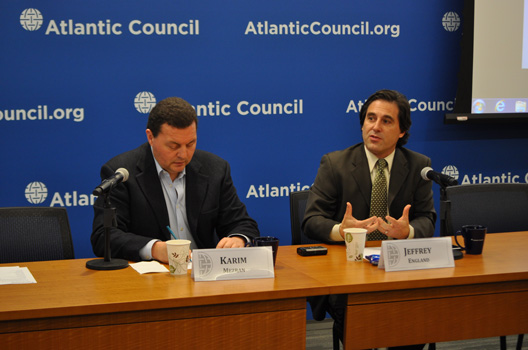 On December 21, Tunisians will cast their ballots in the runoff presidential election between Interim President Moncef Marzouki and Nidaa Tounes leader Beji Caid Essebsi. The landmark vote will close the first chapter of a delicate political transition, but perhaps more importantly, will mark the beginning of real governance challenges.
On December 21, Tunisians will cast their ballots in the runoff presidential election between Interim President Moncef Marzouki and Nidaa Tounes leader Beji Caid Essebsi. The landmark vote will close the first chapter of a delicate political transition, but perhaps more importantly, will mark the beginning of real governance challenges.
The Atlantic Council’s Rafik Hariri Center for the Middle East hosted a roundtable to discuss the key takeaways from the first round of presidential elections last month, the current campaign climate, and Tunisia’s trajectory moving forward. Nonresident Fellow Bassem Bouguerra, a security sector reform activist and expert and former candidate for parliament, and Jeffery England, the deputy regional director for the Middle East and North Africa at the National Democratic Institute participated. Senior Fellow Karim Mezran moderated.
{soundcloud}https://soundcloud.com/atlanticcouncil/what-do-the-presidential-elections-mean-for-tunisias-future{/soundcloud}
The panelists opened with an examination of each candidate’s campaign agenda and the messaging deployed to shore up internal support. According to Bouguerra, the candidates present themselves in distinct ways, but have done little to put forth substantive platforms. Marzouki casts himself as anti-establishment, a poor man’s champion, and the embodiment of the 2011 Jasmine Revolution, while Essebsi touts his credentials for ensuring the country’s security. By successfully tapping into youth disenchantment, Marzouki has aggressively targeted young voters, at times deploying cunning strategy to ensure maximum youth participation. Bouguerra projected higher youth voter turnout for this round, explaining that they would return to their voting districts during the university holidays. Bouguerra proposed that the political gamesmanship displayed by both campaigns were indeed signs of a maturing political system, with candidates willing to operate within established procedures to seek strategic advantages over their rivals.
England acknowledged the impact of Tunisia’s elections on a regional and international stage and emphasized the credibility that Tunisian politicians had gained domestically and internationally by respecting democratic statutes of quick concession and peaceful mobilization of supporters. He also commended Tunisian electoral authorities for their handling of this period marked by three elections in as many months, recognizing the electoral commission’s responses to criticism and expedient training and re-training of election staff, and even deliberate dismissal of problematic staff in some instances.
The discussion also touched on Tunisia’s domestic and international policy vis-à-vis the Qatar vs. United Arab Emirates rivalry. While Tunisia maintains a publically neutral foreign policy, Bouguerra proposed that a decision to ally with either Gulf state could dramatically alter the country’s economic trajectory. England raised the prospect of a potential partnership with Russia, whose interests in oil-driven investments could open a new front for Tunisia-Russia relations. However, England urged caution in economic-driven relations with the Gulf, noting that the fragile domestic peace between rival internal factions could potentially suffer if the country’s leaders chose the ‘wrong’ Gulf state partners.
Overall, Tunisia’s political parties and various stakeholders have struck a considerable degree of social harmony in a climate of polarization, but domestic uncertainty in the economic and security sectors places the new government in an increasingly delicate position. The presidential run-off will be the first step toward answering how Tunisia’s leaders will navigate the challenges.
